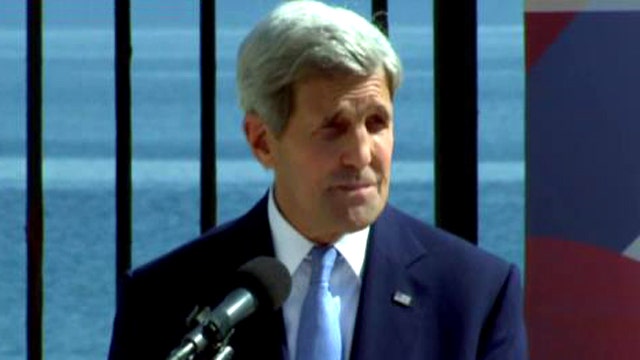Kerry: Cuba's future is for Cubans to shape
Secretary of state addresses flag ceremony at US embassy in Havana
Secretary of State John Kerry marked the historic re-opening of the U.S. Embassy in Havana on Friday after a half-century-long freeze, amid lingering tensions between the two countries and deep concern among anti-Castro lawmakers in Washington.
"There will be hiccups along the way, but it's a start," Kerry acknowledged, speaking briefly to reporters before a ceremony where the U.S. flag was hoisted above the embassy for the first time in 54 years.
Kerry's Cuba visit was the first by a U.S. secretary of state since 1945. In an address outside the embassy, fragments of which were delivered in Spanish, Kerry called for "pushing aside old barriers and exploring new possibilities."
"Having normal relations makes it easier to talk -- and talk can deepen understanding even when we know full well we will not see eye-to-eye on everything," Kerry said.
Cuban-American lawmakers in Washington fumed over Friday's ceremony. As Sen. Marco Rubio, R-Fla., blasted the administration's deals with Iran and Cuba in a New York speech, Sen. Bob Menendez, D-N.J., issued a scathing statement citing the continuing human rights problems on the island.
"This is a one-sided deal that is a win for the Cuban regime and a loss for the Cuban people," Menendez said. "The U.S. Embassy in Havana will be a hollow one. ... It will be diplomacy for show, not in practice. The United States' flag should only fly in Cuba when the island is free, when dissent is embraced, and when democracy is restored."
In a reminder of the rocky road ahead, Fidel Castro said in a newspaper column on the eve of the ceremony that the U.S. owes the island "numerous millions of dollars" for damages caused by the embargo. Americans, too, also want to resolve billions of dollars in half-century-old claims over property confiscated after the Cuban revolution.
In his speech in New York City on Friday, Rubio slammed the Obama administration's outreach to Iran and Cuba. Deals with both countries, the Republican presidential candidate said, "represent the convergence of nearly every flawed strategic, moral, and economic notion that has driven President Obama's foreign policy."
But in Havana, Kerry vowed that "citizens of both [countries] will benefit" from normalized relations.
He said Cubans and Americans are "no longer enemies or rivals, but neighbors," while also saying the Cuban people "would be best served by a genuine democracy."
This is just the start of the process.
Soon after Kerry heads home Friday evening, the Cuban and U.S. diplomats who negotiated the embassy reopening will launch full-time into the next phase of detente: expanding economic ties between the two nations with measures like direct flights and mail service.
Presidents Obama and Raul Castro announced on Dec. 17 that they would re-establish diplomatic ties 54 years after the flag was taken down from the embassy overlooking Havana's seaside boulevard, the Malecon.
Obama also said he would be moving to empower the Cuban people by loosening the U.S. trade embargo on Cuba through a series of executive actions that make it easier for American citizens to travel to Cuba and trade with the island's growing class of private business owners.
Eight months later, Cuba has repeatedly demanded a complete lifting of the embargo. It has not responded to Obama's actions with measures that would allow ordinary Cubans to benefit from them, such as allowing low-cost imports and exports by Cuban entrepreneurs looking to do business with the U.S.
"I think we're ending one phase and entering another," said Robert Muse, a U.S. lawyer specializing in Cuba. "The handshakes, the fraternal regards, the raising of the flags, that'll end on Aug. 14. Then I think it's very particular conversations begin."
While Cuba has increased its highly limited Internet access since Dec. 17 in a measure U.S. officials partially attribute to the warming with Washington, ordinary Cubans are growing increasingly impatient for concrete results from the new relationship.
The U.S. tried several times to hold discussions with Cuban officials about the details of Obama's loosening of U.S. regulations but those meetings never happened amid the pressure to strike a deal allowing the reopening of embassies in Havana and Washington on July 20.
U.S. diplomats say that such a meeting, which will hopefully lead to a real increase in trade with the U.S., is among the top priorities of the normalization talks expected to start in earnest in coming weeks.
After the flag ceremony and a meeting with Havana Archbishop Jaime Ortega, Kerry met with Cuban Foreign Minister Bruno Rodriguez Parrilla followed by a news conference and the raising of a second flag at the stately home of the embassy's chief of mission, where the secretary of state met with Cuban dissidents.
Kerry said in a series of interviews with Spanish-language press Wednesday that the day would move the U.S.-Cuban relationship into a series of detailed talks about topics including "law enforcement, maritime security, education, health, telecommunications."
The Associated Press contributed to this report.






















